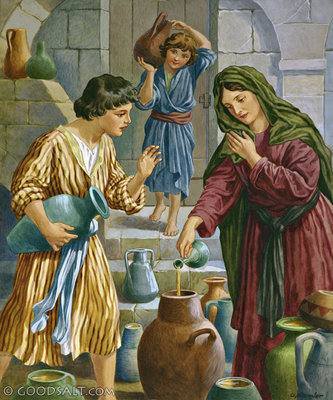"Is your engagement on OnlySimchas?" she had asked at my l'chaim.
"No," I responded, "and I don't want it on there."
She raised a disbelieving eyebrow. "You don't want your engagement on the jumbotron in Times Square?"
"Nope."
I've never been comfortable in the spotlight. Not even amongst my family. It may go back to a childhood Pesach seder, when I butchered the Yiddish Ma Nishtana and had the whole table, including my Babi, rolling.
Han, bless his heart, actually listened to me when I said, "I don't do scenes," and gave me the simple, perfect, understated proposal I could have wanted (much to others' disappointment).
While this may be chalked up to unavoidable genetics, I actually have biblical proof. In Melachim 2 Perek 4, we learn of the story of Elisha and who the meforshim say is the widow of Ovadiah. Her husband had died with debts, and creditors were threatening to take her sons in lieu of payment.
Elisha asks her what she has in the house, and she says only a small jar of oil. He instructs her to borrow as many empty containers as she can. When she has done so, he says: "Close the door." Then, the miracle occurs, with no witnesses but herself, as the small jar filled the multitude of vessels, enough to sell, repay the debts, and keep her children.

I was once at a shiur when the speaker repeated, "Close the door." Bracha doesn't feel a need for a large studio audience. It has nothing to prove. It's nurtured in quiet, hidden places.
This is what I thought of when I read, "Are You Really in Love if It's Not on Instagram?" by Krista Burton.
If you have to keep reminding everyone of how happy you are, something’s not right. Happy people don’t need to announce over and over how happy they are. Happy people just … are. Your friends? They know when you’re in a healthy and loving relationship just by seeing you and knowing you. You don’t need to declare it every time you go online. These constant #relationshipgoals posts doth protest too much.
I have to second that opinion. Why must you announce how happy you are? Who are you trying to convince? Yourself?
And if you are genuinely happy, then is it the most tactful thing to telegraph your joy to those who aren't? Who may, in turn, become envious? Who will wonder why you are in a blissful relationship while they aren't?
Because I was on the other side for a long, long time. Every engagement I heard of had two reactions: a small amount of happiness for the couple, and a larger wallop of "Why not me? What am I doing wrong? Am I picky like the harpies say?"
Everyone gets hysterical about ayin hara. What is it, exactly? The idea is that when one is too much in other people's mouths, it may draw a critical eye upon one. I even heard from Rabbi Glatstein (quoting a source that I cannot recall) that that is why a chosson and kallah go to the cemetery prior to their wedding.
Everyone gets hysterical about ayin hara. What is it, exactly? The idea is that when one is too much in other people's mouths, it may draw a critical eye upon one. I even heard from Rabbi Glatstein (quoting a source that I cannot recall) that that is why a chosson and kallah go to the cemetery prior to their wedding.
Solution? Don't put yourself in the mouths in the first place.



